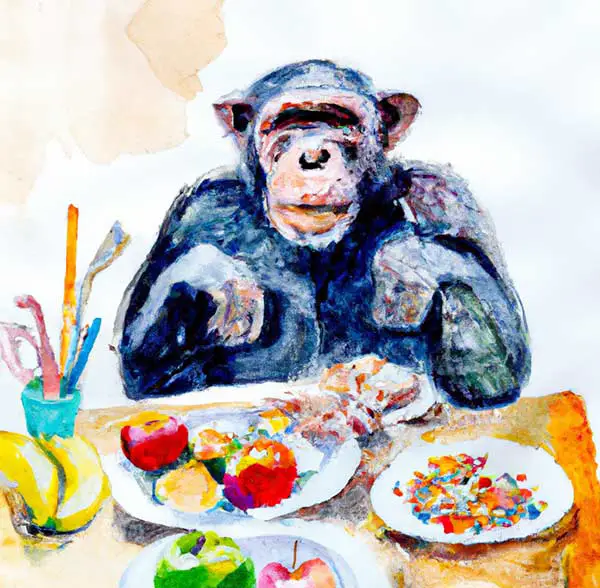Chimpanzees are highly intelligent, social primates that live in tropical and subtropical forests throughout equatorial Africa from Senegal to Ethiopia. While their diet does resemble those of other primates, they are slightly more inclined to eat meat than most of their fellow ape species!
Chimpanzees are opportunistic feeders that will eat anything they can get. In fact, chimpanzees are true omnivores (like humans!) and they will eat both plants and animals. In the wild, they mainly eat fruit, but they also eat leaves, flowers, insects, and small vertebrates. Their diet changes between seasons, as different food types become more abundant.
Chimpanzees are fruit specialists that eat a large number of ripe fruits. In fact, they feed on fruit from 100 different species, including figs, kola, and even fruits from orchids.
But chimpanzees are opportunistic feeders and in some areas, they will sometimes hunt other monkeys, duikers, and other mammals for meat. In other regions, they will just eat insects, fish, and bird eggs.
They live in social groups containing up to 150 individuals, and these groups are split into smaller subgroups called “clans.” The alpha male is the primary leader of the group, and he is usually the most aggressive.
Are Chimpanzees Carnivores, Herbivores or Omnivores?
Chimpanzees are omnivores because they eat both plants and animals. They will eat both meat and vegetation, but their diet is typically more than 90% vegetarian!
While chimpanzees are mostly vegetarians, their diets seem to vary from place to place. Chimpanzees are what you might call opportunistic feeders as their diet varies from fruit to small mammals and reptiles.

Chimpanzees eat a diet that consists mainly of fruits, leaves, seeds, shoots, bulbs, bark, stems, roots, buds and mushrooms but also termites, ants, earthworms, snails, small animals, and eggs.
Do chimpanzees eat other animals?
Yes, chimpanzees do eat other animals. They primarily eat fruits and vegetables, but will also eat insects, eggs, nuts, and small mammals.
For example, chimpanzees use sticks to catch ants and termites. The sticks are inserted into the hole of an active ant or termite mound. When the stick is pulled out, it is covered in insects. The chimpanzee then licks the stick clean.

Chimpanzees also sometimes eat caterpillars, reptiles, and amphibians.
Can Chimpanzees be Considered Scavengers?
Chimpanzees are not scavengers because they do not deliberately seek out rotting matter and dead animals. However, if there is meat that is already dead available, they might still eat it depending on its state.
This may be due to the fact that fresh meat is hard to come by, so they will take what they can get. If there is a carcass nearby, they will most likely investigate it and see if it is fresh enough to be eaten or too old with a chance of them getting sick.
Chimpanzees have been known to store and save meat for days after which they eat it!
Where are Chimpanzees in the Food Chain?
Chimpanzees are considered omnivores because their diet contains both plants and animals. Omnivores are animals who eat both plants and animals.
In general, carnivores are primary consumers, herbivores are secondary consumers and omnivores are tertiary consumers.

Chimpanzees are important for the ecosystem because they are omnivores. This means that they eat both plants and animals, which helps to keep the balance between the two.
They also help to spread seeds and pollen around, which is essential for plant life. Chimpanzees also play a key role in the food chain by eating other animals and keeping population numbers in check.
Are Chimpanzees Autotrophs or Heterotrophs?
Chimpanzees are heterotrophs because they eat other living organisms. Practically no animals are autotrophic because animals do not get their energy directly from the sun as plants do.
That is, animals like the chimpanzees cannot make their own energy but need to eat other organisms as their energy and carbon source.
What Animals Hunt and Eat Chimpanzees?
Chimpanzees, like humans, are at the top of the food chain. They are considered apex predators because chimpanzees can hunt and eat other primates and animals, as well as plants.

As such, chimpanzees are hunted by leopards, hyenas, and other large predators in the jungle.
Chimpanzees can also be hunted by humans, though this is rare and strictly illegal!
Conclusion
The chimpanzee is a species of primate that is native to sub-Saharan Africa. Chimpanzees are the closest living relatives to humans.
Chimpanzees are fascinating animals, and as well as being our closest extant evolutionary relatives, they are also our closest cousins when it comes to diet!
While they eat mostly fruits, they are indeed omnivores and they do also eat smaller animals like insects and even eggs and vertebrates.
Their diet is not much different from other apes so their diet will resemble that of gorillas and orangutans diet as well.
Chimpanzees are very intelligent animals, and they have been known to use tools and even make weapons.
Chimpanzees are also animals that have a very interesting social system, and many groups are social hunters, using complex tactics and teamwork to catch their prey.
Chimpanzees are intelligent animals and they often act as problem solvers, making them excellent tool makers and using them when hunting. They are also curious animals and often use tools.
They also have an excellent sense of smell which they use to find food. They use their hands to eat, and their large molars which grow continuously keep their tool sharp!
If you are interested in the diet of apes and monkies, check out some of my other posts at the end of this page!




